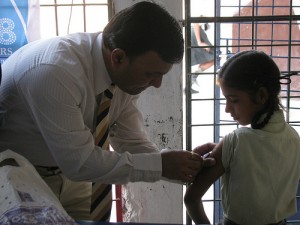To Vaccinate or Not to Vaccinate
In today’s society the questions of whether or not to vaccinate children brings up very strong opinions. In 1998, Dr. Andrew Wakefield claimed that there was a direct link from the Measles, Mumps, and Rubella (MMR) Vaccine to autism and bowel disease. The claim made by Wakefield has now been discredited, but is still raising many opinions and ideas of whether to vaccinate children or not. The products used in vaccinations have caused some queries for withholding vaccines as well. Today nearly 40% of U.S. parents do not vaccinate their children due to many groundless fears. Not vaccinating children not only puts them at risk but puts others at risk as well. Prior to the 1920s before the diphtheria vaccine there were thirteen to fifteen thousand deaths per year from diphtheria, today there are 0 reported cases of diphtheria in the U.S. Before the Salk vaccine for Polio was developed in 1952 there were about fifty thousand cases of polio, today there is an estimated 1 case reported. Vaccinations are crucial to control and eradicate disease. Are there specific issues that still cause people to withhold vaccinations for themselves and their children? Is the safety of vaccinations credible and should vaccinations schedules be instituted to prevent the recurrence of previously eliminated diseases.
Vaccines: Separating Facts from Fear
Vaccines are necessary for the following reasons:
- Common disease, like chicken pox, vaccines prevent common diseases.
- A choice not to get vaccinated is a choice to get the disease
- Chicken pox is not deadly but can be deadly for a small percentage
- Vaccines keep uncommon diseases uncommon
- Vaccines protect against remote disease- diseases not eradicated in other parts of the world
- Vaccination is safer than natural infection
- all vaccines have mild side effects, pain, tenderness at the site, the new pertussis vaccine can cause listlessness, inconsolable crying, and high fever
- Vaccines don’t cause MS, DM, or IBS, Autism, or DIS
- MMR vaccines-autism study- this report in the UK has never been reproduced. Brent Taylor studied 400 children and the MMR vaccine does not cause autism, two other studies tried to replicate the UK study and they could not, which means that the first study in the UK can be discredited

By: Jon Grainger
Statistics about Vaccines
- Measles can be a fatal disease 1 in 1,000 kids will die if infected
- Vaccines are always changing and have changed and are safer than 30 years ago
- In the 1980s children received 23 doses of 7 vaccines, in 2010 children receive 69 doses

By: Partha S. Sahana
of 16 vaccines
- 9 billion vaccines given and 18,000 documented poor outcomes
- 1 in 5500 diseases of vaccines cause a problem
- 1 in 600 kids/year will catch vaccine preventable disease
- Life expectancy in the US is higher than ever before because of vaccines
THE VACCINE DEBATE
The controversy regarding vaccines
- FDA has not studied ingredients in vaccines and has not researched how human bodies process it
- High doses of mercury don’t cause autism but contribute to brain dysfunction
- Aluminum studied on mice showed immediate changes and brain dysfunction
- Doctors are financially benefiting from vaccines
- There are severe consequences due to the current vaccine policy and schedule, many of which are simply dismissed as coincidence or diagnosed improperly
- Vaccination system is not working well for today’s society
What YOU Need to Know
The experts that support vaccination schedules and the safety of vaccinations far outnumber the experts who did not agree with vaccination safety and their effectiveness. The biggest reason that people refuse to vaccinate is because of false information provided by society. Research concludes that vaccinations are safe and effective in eradicating diseases. When individuals refuse to vaccinate it not only puts them at risk but it puts others who are immunocompromised and cannot receive vaccinations at risk. Noncompliance with a vaccinations schedule will not only lead to potential reemergence of previously eradicated diseases but also the deadly complications of these diseases. Vaccinating is important for the future of the society and their safety.
Still Have questions? Don’t Worry!
- Make an appointment and talk to your pediatrician about your concerns
- Visit a credible website like the CDC Website for more information (http://www.cdc.gov/vaccines/hcp/patient-ed/conversations/downloads/talk-infants-color-office.pdf)
- Or visit the online education center at the Children Hospital of Philadelphia for more infromation (http://www.chop.edu/centers-programs/vaccine-education-center#.V77B6_krLDc)
References
Driver, C. (2015). Case studies in childhood vaccination. Nurse Prescribing, 13(3), 122-126. Retrieved October 24, 2015
Jarrett, C., Wilson, R., O’Leary, M., Eckersberger, E., & Larson, H. J. (2015, April 18). Strategies for addressing vaccine hesitancy – A systematic review. Vaccines, 33, 4180-4190. Retrieved Ocotber 24, 2015, from http://dx.doi.org/10.1016/j.vaccine.2015.04.040
Maglione, M. A., Das, L., Raaen, L., Smith, A., Charr, R., Newberry, S., . . . Gidengil, C. (2014). Safety of Vaccines Used for Routine Immunization of U.S. Children: A Systemic Review. Pediatrics, 134(2), 1-13. Retrieved October 24, 2015
OYE Global .(2015, January 23).The Greater Good[Video File] retrieved from https://www.youtube.com/watch?v=o_nWp6ZHA2Q
The Children’s Hospital Of Philadelphia.(2009, November 16).Vaccines: Separating Fact from Fear – The Children’s Hospital of Philadelphia[Video File} retrieved from https://www.youtube.com/watchv=7CrvznJOt2I&feature=youtu.be&list=PL054F3874DB216361
The Doctors. (2008, December 3).Child Vaccinations – The Doctors Debate [Video File] retrieved from https://www.youtube.com/watch?v=eMrFV2rnHlo

